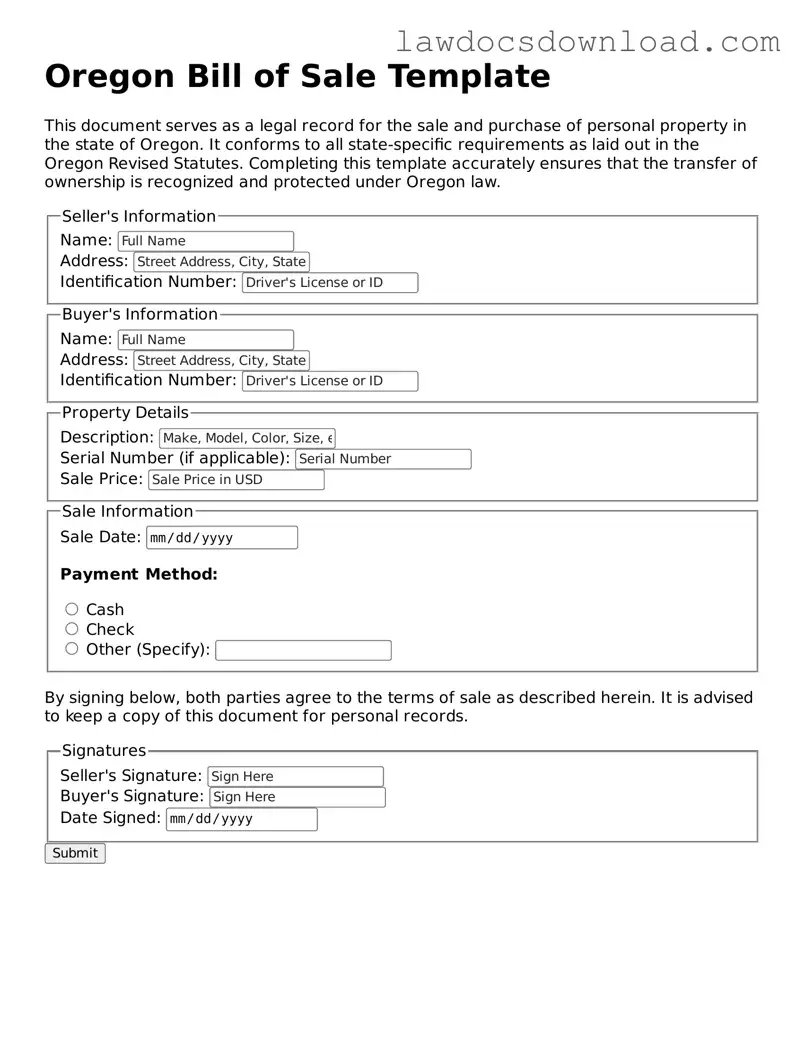The Oregon Bill of Sale form shares similarities with a Vehicle Title Transfer form. Both documents are used in the process of legally transferring ownership of a vehicle from one party to another. The critical difference lies in the extent of information provided about the vehicle, including its history and current condition in the Vehicle Title Transfer, while the Bill of Sale focuses on the transaction details.
Similar to the Bill of Sale, a Warranty Deed is used to transfer property ownership; however, it specifically involves real estate transactions. The Warranty Deed guarantees that the property is free from any claims or liens, offering more protection to the buyer than a Bill of Sale typically does for personal property transactions.
A Quitclaim Deed, while also used in real estate, more closely resembles the Bill of Sale in terms of the level of protection it offers to the buyer. It transfers ownership without any warranties, meaning the buyer receives no guarantee regarding the property's title status, similar to how a Bill of Sale operates for personal property.
The General Affidavit is a written statement sworn to be true, which can support the validity of the information provided in a Bill of Sale. Although serving different primary purposes—the Affidavit for verifying facts and the Bill of Sale for detailing a transaction—both can be essential in legal processes to establish the truth or prove ownership.
A Sales Agreement, much like a Bill of Sale, outlines the conditions of a sale between a buyer and a seller. However, it is more detailed and may encompass terms of payment, delivery, and warranties, making it broader in scope and offering a more comprehensive outline of the transaction's terms than the typically more straightforward Bill of Sale.
The Promissory Note bears resemblance to the Bill of Sale as it involves agreements related to financial transactions. While the Bill of Sale confirms the transfer of ownership tied to a purchase, a Promissory Note outlines the buyer's promise to pay the seller a specified amount under agreed-upon conditions, often connected to the sale.
The Gift Deed and the Bill of Sale are similar in their function to transfer ownership of property, but the context differs significantly; the Gift Deed is used when property is given without compensation, and, unlike the Bill of Sale, it typically must be recorded to be effective.
A Loan Agreement shares the characteristic of stipulating terms between two parties with the Bill of Sale. It differs by focusing on the terms of a loan between a lender and borrower, including interest rates and repayment schedules, rather than detailing a straightforward purchase and sale.
Personal Property Rental Agreements are akin to Bills of Sale in that they pertain to personal property transactions. However, rather than a sale, these agreements cover the terms under which personal property is rented by one party to another, including duration and payment.
Lastly, the Power of Attorney document, while primarily designated for granting someone the authority to make decisions on another's behalf, parallels the Bill of Sale's function of assigning ownership or rights under specific conditions. The crucial difference is that a Power of Attorney can cover a wide array of actions beyond mere transactions, including the sale or management of personal property.

